Related Research Articles
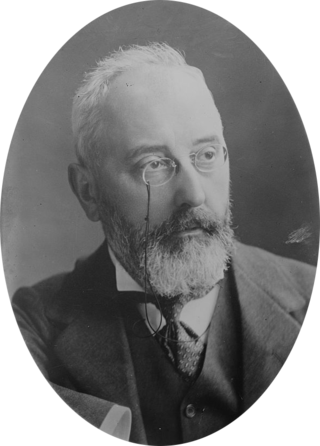
Timothy Michael Healy, KC was an Irish nationalist politician, journalist, author, barrister and a controversial Irish Member of Parliament (MP) in the House of Commons of the United Kingdom of Great Britain and Ireland. His political career began in the 1880s under Charles Stewart Parnell's leadership of the Irish Parliamentary Party (IPP) and continued into the 1920s, when he was the first governor-general of the Irish Free State.
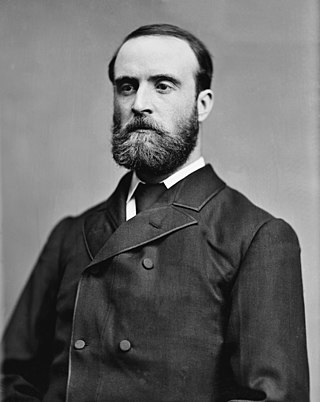
Charles Stewart Parnell was an Irish nationalist politician who served as a Member of Parliament (MP) in the United Kingdom from 1875 to 1891, Leader of the Home Rule League from 1880 to 1882, and then of the Irish Parliamentary Party from 1882 to 1891, who held the balance of power in the House of Commons during the Home Rule debates of 1885–1886. He fell from power following revelations of a long-term affair, and died at age 45.
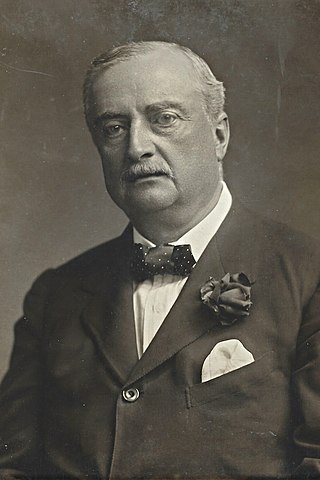
John Edward Redmond was an Irish nationalist politician, barrister, and MP in the House of Commons of the United Kingdom. He was best known as leader of the moderate Irish Parliamentary Party (IPP) from 1900 until his death in 1918. He was also leader of the paramilitary organisation the Irish National Volunteers (INV).

Irish nationalism is a nationalist political movement which, in its broadest sense, asserts that the people of Ireland should govern Ireland as a sovereign state. Since the mid-19th century, Irish nationalism has largely taken the form of cultural nationalism based on the principles of national self-determination and popular sovereignty. Irish nationalists during the 18th, 19th, and 20th centuries such as the United Irishmen in the 1790s, Young Irelanders in the 1840s, the Fenian Brotherhood during the 1880s, Fianna Fáil in the 1920s, and Sinn Féin styled themselves in various ways after French left-wing radicalism and republicanism. Irish nationalism celebrates the culture of Ireland, especially the Irish language, literature, music, and sports. It grew more potent during the period in which all of Ireland was part of the United Kingdom, which led to most of the island gaining independence from the UK in 1922.
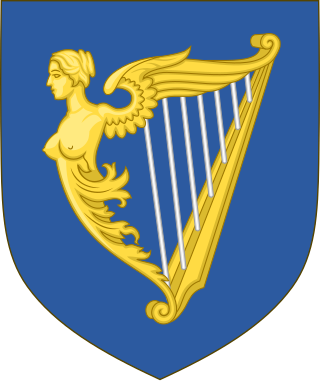
The Irish Parliamentary Party was formed in 1874 by Isaac Butt, the leader of the Nationalist Party, replacing the Home Rule League, as official parliamentary party for Irish nationalist Members of Parliament (MPs) elected to the House of Commons at Westminster within the United Kingdom of Great Britain and Ireland up until 1918. Its central objectives were legislative independence for Ireland and land reform. Its constitutional movement was instrumental in laying the groundwork for Irish self-government through three Irish Home Rule bills.

William O'Brien was an Irish nationalist, journalist, agrarian agitator, social revolutionary, politician, party leader, newspaper publisher, author and Member of Parliament (MP) in the House of Commons of the United Kingdom of Great Britain and Ireland. He was particularly associated with the campaigns for land reform in Ireland during the late 19th and early 20th centuries as well as his conciliatory approach to attaining Irish Home Rule.
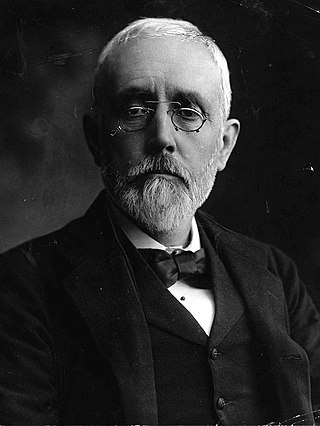
John Dillon was an Irish politician from Dublin, who served as a Member of Parliament (MP) for over 35 years and was the last leader of the Irish Parliamentary Party. By political disposition Dillon was an advocate of Irish nationalism, originally a follower of Charles Stewart Parnell, supporting land reform and Irish Home Rule.

The Home Rule League (1873–1882), sometimes called the Home Rule Party, was an Irish political party which campaigned for home rule for Ireland within the United Kingdom of Great Britain and Ireland, until it was replaced by the Irish Parliamentary Party. The Home Rule Confederation of Great Britain was a sister organisation in Great Britain.

Joseph Devlin was an Irish journalist and influential nationalist politician. He was a Member of Parliament (MP) for the Irish Parliamentary Party in the House of Commons of the United Kingdom. Later Devlin was an MP and leader of the Nationalist Party in the Parliament of Northern Ireland. He was referred to as "the duodecimo Demosthenes" by the Irish politician Tim Healy which Devlin took as a compliment.

Timothy Charles Harrington was an Irish journalist, barrister, nationalist politician and Member of Parliament (MP) in the House of Commons of the United Kingdom.

The Irish National League (INL) was a nationalist political party in Ireland. It was founded on 17 October 1882 by Charles Stewart Parnell as the successor to the Irish National Land League after this was suppressed. Whereas the Land League had agitated for land reform, the National League also campaigned for self-government or Irish Home Rule, further enfranchisement and economic reforms.

The Irish National Federation (INF) was a nationalist political party in Ireland. It was founded in 1891 by former members of the Irish National League (INL), after a split in the Irish Parliamentary Party (IPP) on the leadership of Charles Stewart Parnell. Parnell had refused to resign his leadership of the party after being named in divorce proceedings against Katharine O'Shea by the former MP William O'Shea. In the aftermath of the divorce, William Ewart Gladstone, leader of the Liberal Party, had declared that he would not work with Parnell, damaging the parliamentary alliance between the IPP and the Liberals.
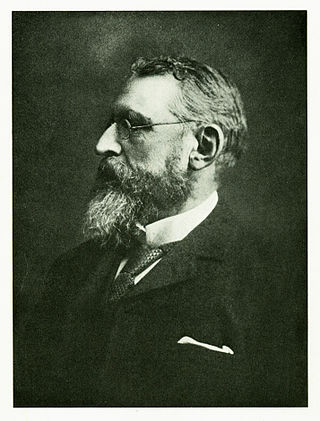
The United Irish League (UIL) was a nationalist political party in Ireland, launched 23 January 1898 with the motto "The Land for the People". Its objective to be achieved through agrarian agitation and land reform, compelling larger grazier farmers to surrender their lands for redistribution among the small tenant farmers. Founded and initiated at Westport, County Mayo by William O'Brien, it was supported by Michael Davitt MP, John Dillon MP, who worded its constitution, Timothy Harrington MP, John O'Connor Power MP and the Catholic clergy of the district. By 1900 it had expanded to be represented by 462 branches in twenty-five counties.
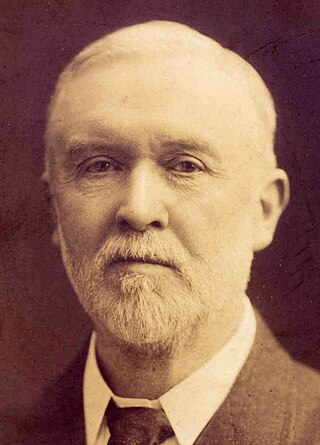
John Joseph Clancy, usually known as J. J. Clancy, was an Irish nationalist politician and Member of Parliament (MP) in the House of Commons for North Dublin from 1885 to 1918. He was one of the leaders of the later Irish Home Rule movement and promoter of the Housing of the Working Classes (Ireland) Act 1908, known as the Clancy Act. Called to the Irish Bar in 1887, he became a King's Counsel in 1906.

Patrick O'Brien was Irish Nationalist MP in the House Of Commons of the United Kingdom of Great Britain and Ireland and as member of the Irish Parliamentary Party represented North Monaghan (1886–1892) and Kilkenny City (1895–1917). He was Chief Whip of the Irish Party from 1907 until his death in 1917.

Edmund Leamy was an Irish journalist, barrister, author of fairy tales, and nationalist politician. He was a Member of Parliament (MP) in the House of Commons of the United Kingdom of Great Britain and Ireland as member of the Irish Parliamentary Party. A leading supporter of Charles Stewart Parnell, he represented various Irish seats for much of the period from 1880 until his death in 1904.
John O'Connor was an Irish Nationalist revolutionary-turned Irish Parliamentary Party parliamentarian MP in the House of Commons of the United Kingdom of Great Britain and Ireland and as member of the Irish Parliamentary Party represented Tipperary in 1885, and South Tipperary from 1885 to 1892, and North Kildare from 1905 to 1918. He was also member of the English Bar.

Jeremiah JordanJ.P. was an Irish nationalist politician from County Fermanagh. He was a Member of Parliament (MP) from 1885 to 1892, and from 1893 to 1910, taking his seat in the House of Commons of the United Kingdom of Great Britain and Ireland.
James Gubbins Fitzgerald was a medical practitioner and an Irish nationalist politician and Member of Parliament (MP) in the House of Commons of the United Kingdom of Great Britain and Ireland. As a member of the Irish Parliamentary Party, he represented South Longford from 1888 to 1892. He was a strong supporter of Charles Stewart Parnell.

Thomas Sexton (1848–1932) was an Irish journalist, financial expert, nationalist politician and Member of Parliament (MP) in the House of Commons of the United Kingdom of Great Britain and Ireland from 1880 to 1896, representing four different constituencies. He was High Sheriff of County Dublin in 1887 and Lord Mayor of Dublin from 1888 to 1890. Sexton was a high ranking member of the Irish Parliamentary Party, raised up by Charles Stewart Parnell himself. However, Sexton broke with Parnell and joined the Anti-Parnellites in 1891 following Parnell's marriage scandal. Sexton was disheartened by the subsequent infighting amongst the Anti-Parnellites and pulled back from politics. He thereafter became the chairman of the Freeman's Journal, one of the largest newspapers in Ireland.
References
- ↑ Mulvagh, Conor. "Explainer: What was Home Rule? | Century Ireland". RTÉ . Retrieved 12 February 2024.
In 1870, Isaac Butt, a barrister and former Tory MP, founded the Irish Home Government Association.
- ↑ Mulvagh, Conor. "Explainer: What was Home Rule? | Century Ireland". RTÉ . Retrieved 12 February 2024.
By 1874, styled as the Home Rule League, Butt's nascent party succeeded in gaining the loose allegiance of 59 out of 103 Irish MPs.
- ↑ Mulvagh, Conor. "Explainer: What was Home Rule? | Century Ireland". RTÉ . Retrieved 12 February 2024.
The most significant event to occur in the emergence of a more powerful Home Rule movement was in 1880 when Charles Stewart Parnell was elected chairman of the party.
- ↑ English, Richard (2007). Irish Freedom: A History of Nationalism in Ireland (illustrated, reprint ed.). Pan Books. p. 192. ISBN 9781405041898.
And then on 3 March 1874 a gathering of Irish Home Rule MPs, meeting in Dublin, set up a Home Rule Party. The aim was to form and consolidate a genuine party for Home Rule in the London House of Commons, a party which would pursue restoration of an Irish legislature.
- ↑ McCausland, Malcolm (2020). Lion for a Day. AuthorHouse UK (published 22 September 2020). ISBN 978-1728356723.
Parnell was imprisoned in Kilmainham Gaol in 1882 but released when he renounced the violent extra-parliamentary action. The same year, he reformed the Home Rule League as the Irish Parliamentary Party, which he controlled minutely as Britain's first disciplined democratic party.
- ↑ 'Parnell's Old Brigade': The Redmondite-Fenian Nexus in the 1890s.
- ↑ Kelly, Matthew (2002). "'Parnell's Old Brigade': the Redmondite–Fenian nexus in the 1890s". Irish Historical Studies. Cambridge University Press. 33 (130): 209. doi:10.1017/S0021121400015698. JSTOR 30006941.
At this time the home rule movement had split into two opposing factions, the Parntellites and the anti-Parnellites. They might be referred to respectives as the Redmondites (named after the leader of the Parnellites, John Redmon) and the Federationists (named after the main anti-Parnellite organisation, the Irish National Federation).
- ↑ Bull, Philip (1988). "The United Irish League and the Reunion of the Irish Parliamentary Party, 1898-1900". Irish Historical Studies. Cambridge University Press. 26 (101): 51. doi:10.1017/S0021121400009445. JSTOR 30008504.
The chronic factionalism and dissensions which had plagued Irish nationalist politics after the fall of Parnell in 1890 was finally brought to an end with the reunion of the Irish parliamentary party in January 1900.
- ↑ McConnel, James (2018). "'Out in the cold'?: The children of the Irish Parliamentary Party and the Irish Free State". Irish Historical Studies. Cambridge University Press. 42 (161): 107. doi:10.1017/ihs.2018.5.
Following the winding up of the now moribund National League Party in 1931, W. A. Redmond joined Cumann na nGaedheal and shortly before his early death he was elected on its ticket at the 1932 general election.
- ↑ Downing, John (7 February 2016). "The widow vote: when women candidates ran for family seats". Independent.ie. Retrieved 12 February 2024.
Fine Gael's Bridget Mary Redmond, a TD from 1933 until 1952, was the widow of Captain William Redmond who had died in 1932. She continued over half a century of continuous parliamentary representation for Waterford, begun by Irish Parliamentary Party leader, John Redmond, in the British House of Commons in 1891.
- ↑ Mallon, Seamus; Phoenix, Eamon (2003). "Nationalism in Northern Ireland from partition to the Belfast agreement : a political perspective ;an academic perspective" (PDF). IBIS Working Papers. The path to peace: negotiating and implementing the Belfast agreement Lecture Series. University College Dublin. Institute for British-Irish Studies: 7.
This reduced the Nationalist Party to a role analogous of "local notables", lacking even in a formal party organisation; they were "like bishops, answerable to no one".
- ↑ "CAIN: Politics: Lynn, B. (1997), Holding the Ground the Nationalist Party in Northern Ireland, 1945-1972". cain.ulster.ac.uk. Retrieved 12 February 2024.
- ↑ Murphy, Michael A. (1992). "Gerry Fitt: Ulster Politician" (PDF). core.ac.uk (Dissertation). p. 246. Retrieved 12 February 2024– via Loyola University Chicago.
The Irish Independence Party (I.I.P.), was formed in October 1977. This new party was a direct challenge to the S.D.L.P., its leading figures being former Unity M.P. for Fermanagh/South Tyrone, Frank McManus, and Fergus McAteer, son of the Nationalist Party leader and a Londonderry Councillor.
- ↑ Craig, F. W. S., ed. (1974). British parliamentary election results 1885–1918 (2nd ed.). Palgrave Macmillan London (published 18 July 1974). p. 143. doi:10.1007/978-1-349-02298-4. ISBN 978-1-349-02298-4.
- 1 2 Craig, F. W. S., ed. (1977). British parliamentary election results, 1918-1949 (3rd ed.). Palgrave Macmillan London. p. 179. ISBN 978-0333230480.
- ↑ "Conference member: T P O'Connor MP". parliament.uk. Retrieved 12 February 2024.
Initially elected for Galway, he then became the only MP to be elected as an Irish Nationalist for an English constituency, Liverpool Scotland, between 1885 and 1929.
- ↑ McCaffrey, Lawrence J. (1960). "Isaac Butt and the Home Rule Movement: A Study in Conservative Nationalism". The Review of Politics. Cambridge University Press. 22 (1): 72. doi:10.1017/S0034670500007580. JSTOR 1405267.
This evaluation of the formative years of Home Rule and the first leader of the movement is inadequate on several counts: it fails to appreciate Butt's success in resurrecting an interest in nationalism among the Irish masses following the Tenant Right and Fenian failures of the 1850's and 1960's;
- ↑ Neville, Conor (2011). "Imperial precedents in the Home Rule Debates, 1867-1914" (PDF). mural.maynoothuniversity.ie. Retrieved 12 February 2024.
Butt was succeeded by William Shaw, non-conformist clergyman and the chairman of the prestigious Munster Bank who sat for the famously Tory stronghold of Bandon.
- 1 2 "Parnell – A Terrible Beauty is Born: The Easter Rising at 100". exhibitions.lib.udel.edu. Retrieved 12 February 2024.
Protestant landlord Charles Stewart Parnell (1846-1891) was the acknowledged leader of the Irish nationalist movement between 1880 and 1882. Known as the "uncrowned king of Ireland," Parnell formed the Irish Parliamentary Party in 1882, whose legislative agenda was Irish Home Rule and land reform.
- 1 2 "Temp Head". Independent.ie. 11 April 2008. Retrieved 12 February 2024.
Following the split in the Irish Parliamentary Party over the Parnell scandal, John Redmond led the Parnellite wing of the party from 1891 and became leader of the reunited Party in 1900.
- 1 2 3 "Branch ledger of the Irish National Federation including names and addresses of the officers in each branch,". catalogue.nli.ie. 1891. Retrieved 12 February 2024.
The Irish National Federation was a political party established in 1891 by former members of the INL [Irish National League] who left the Irish Parliamentary Party when Charles Stewart Parnell refused to resign the party leadership as a result of his involvement in the divorce proceedings of Katharine O'Shea. It was led by Justin McCarthy until January 1896 (when he resigned); in February 1896 John Dillon became chairman of the INF. The party was dissolved in 1900 when the membership rejoined the Irish Parliamentary Party under John Redmond with Dillon as Deputy IPP leader.
- ↑ O’Donovan, John (8 February 2016). "Local politics in Cork to the fore at start of 1916". Irish Examiner. Retrieved 12 February 2024.
The IPP, which was made up of all Irish nationalist MPs at Westminster, had reunited in 1900 after the damaging split of 1891. John Redmond was the IPP chairman, and in June 1900 he was elected chairperson of the popular political organisation, the United Irish League (UIL), thus in effect amalgamating the two organisations.
- 1 2 "The rise to fame of 'Wee Joe' Devlin". The Irish News. 18 January 2014. Retrieved 12 February 2024.
THE rise to public life and fame of Joseph Devlin (1871-1934), former co-leader of the Home Rule Party and leader of the Nationalist Party in the North until his death, is worth recalling.
- ↑ "Derry City Cemetery Series: Eddie McAteer, the Scots born stalwart of Derry's nationalist politics". www.derrynow.com. Retrieved 12 February 2024.
In 1964, with the death of Joe Stewart, Eddie McAteer became the leader of the Nationalist Party and the voice of nationalism in the North.